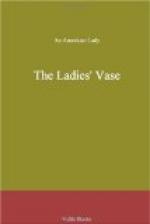MARRIAGE HYMN.
Not for the summer hour alone,
When skies resplendent
shine,
And youth and pleasure fill
the throne,
Our hearts and
hands we join;
But for those stern and wintry
days
Of sorrow, pain,
and fear,
When Heaven’s wise discipline
doth make
Our earthly journey
drear.
Not for this span of life
alone,
Which like a blast
doth fly,
And, as the transient flower
of grass,
Just blossom—droop,
and die;
But for a being without end,
This vow of love
we take;
Grant us, O God! one home
at last,
For our Redeemer’s
sake.
FEMALE INFLUENCE.
Writers of fiction have not unfrequently selected this topic as the theme for poetry and romance; they have extolled woman as the being whose eloquence was to soften all the asperities of man, and polish the naturally rugged surface of his character; charming away his sternness by her grace; refining his coarseness by her elegance and purity; and offering in her smiles a reward sufficient to compensate for the hazards of any enterprise. But while the self-complacency and vanity of many of our sex have been nourished by such idle praise, how few have been awakened to a just sense of the deep responsibility which rests upon us, for the faithful improvement of this talent, and our consequent accountability for its neglect or perversion!
It were not a little amusing, if it were not so melancholy, to listen to the reasoning employed by many ladies, in evading any charges of non-improvement of this trust. She who perhaps but a moment before may have listened with the utmost self-complacency to the flattering strains of the poet, who had invested her sex with every charm calculated to render them ministering angels to ruder and sterner man, no sooner finds herself addressed as the possessor of a talent, implying responsibility, and imposing self-exertion and self-denial in its exercise, than she instantly disclaims, with capricious diffidence, all pretensions to influence over others. But we cannot avert accountability by disclaiming its existence; neither will the disavowal of the possession of a talent alter the constitution of our nature, which God has so formed and so fitted to produce impressions in, and receive them from, kindred minds, that it is impossible for us to exist without exerting a continual and daily influence over others; either of a pernicious or salutary character.




